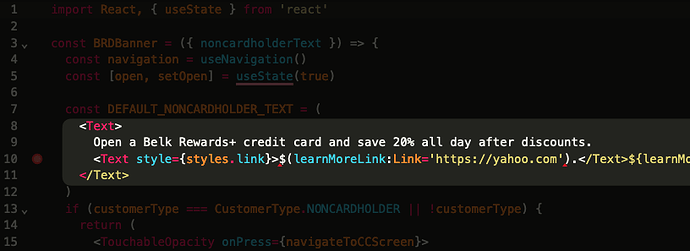Hi, I’m new to CodeMirror, actually I’m using the v6, I’m trying to make it work with my custom templating language below (something very similar to template literals ${})
templating.grammar
@top TemplateString { (Expression | JavaScriptContent)* }
@local tokens {
ExpressionStart[closedBy=ExpressionEnd]{ "$(" }
@else JavaScriptContent
}
@precedence {
Expression
JavaScriptContent
}
@skip {} {
Expression {
ExpressionStart (ScriptText* | "") ExpressionEnd
}
}
@local tokens {
ExpressionEnd[openedBy=ExpressionStart] { ")" }
ScriptText { Identifier ":" Type "="? (Identifier | stringLiteral)? }
}
@tokens {
Identifier { $[a-zA-Z_\-0-9]+ }
Type { (Component | Number | String | Image | Video | Color) }
Component { "Component" }
Number { "Number" }
String { "String" }
Image { "Image" }
Video { "Video" }
Color { "Color" }
stringLiteral { '"' (!["\\] | "\\" _)* '"' }
"$(" ")"
}
templating.ts
import {parser as templatingParser} from "./templating.js"
import {foldNodeProp, foldInside, indentNodeProp, LRLanguage, LanguageSupport} from "@codemirror/language"
import {styleTags, tags as t} from "@lezer/highlight"
import { Diagnostic } from '@codemirror/lint'
import { EditorView } from '@codemirror/view'
import { javascript, javascriptLanguage, jsxLanguage } from '@codemirror/lang-javascript'
import { parseMixed } from '@lezer/common'
let parserWithMetadata = templatingParser.configure({
props: [
styleTags({
Identifier: t.variableName,
Type: t.typeName,
Boolean: t.bool,
String: t.string,
LineComment: t.lineComment,
// "( )": t.paren,
"$( )": t.lineComment,
}),
],
wrap: parseMixed((node) => {
return node.type.name === 'JavaScriptContent' ? {
parser: jsxLanguage.parser,
// overlay: node => node.type.name == "JavaScriptContent"
} : null
// if (node.type.name === 'JavaScriptContent') {
// return {
// parser: jsxLanguage.parser,
// overlay: (node) => {
// console.log(node)
// return node.type.name === 'JavaScriptContent'
// }
// }
// }
// if (node.type.name === 'Expression') {
// return {
// parser: templatingParser,
// }
// }
// return null
}),
})
export const templatingLanguage = LRLanguage.define({
parser: parserWithMetadata,
})
export function templating() {
return new LanguageSupport(templatingLanguage)
}
export function templatingLinter(view: EditorView) {
const code = view.state.doc.toString();
const tree = templatingParser.parse(code);
let messages: Diagnostic[] = [];
tree.iterate({
enter: (type, start, end) => {
if (type.name === 'Identifier' && end - start > 10) {
messages.push({
from: start,
to: end,
message: 'Identifier names should be no more than 10 characters long',
severity: 'warning'
});
}
}
});
return messages;
}
CodeEditor.tsx
import React, { useEffect, useRef } from 'react'
import styled from 'styled-components'
import { basicSetup } from 'codemirror'
import { EditorState, Compartment } from '@codemirror/state'
import { EditorView, keymap } from '@codemirror/view'
import { search, searchKeymap } from '@codemirror/search'
import { esLint, javascript, javascriptLanguage } from '@codemirror/lang-javascript'
import { linter, lintGutter, lintKeymap } from '@codemirror/lint'
import { Linter } from 'eslint-linter-browserify'
import { monokai } from '@uiw/codemirror-theme-monokai'
import { templating, templatingLanguage, templatingLinter } from './templating'
const Container = styled.div`
border-radius: 4px;
overflow-y: scroll;
max-height: 300px;
margin-top: 20px;
margin-bottom: 12px;
`
interface CodeEditorProps {
onChange: (value: string) => void
onLintError?: (errorLength: number) => void
value?: string
width?: number
height?: number
theme?: string
}
const CodeEditor: React.FC<CodeEditorProps> = ({ value, onChange }) => {
const editor = useRef<HTMLDivElement>(null)
const tabSize = new Compartment()
const state = EditorState.create({
doc: value,
extensions: [
basicSetup,
tabSize.of(EditorState.tabSize.of(4)),
keymap.of([...searchKeymap, ...lintKeymap]),
search({ top: true }),
lintGutter(),
linter(esLint(
new Linter(),
{
parserOptions: {
ecmaVersion: 2019,
sourceType: 'module',
ecmaFeatures: { jsx: true }
}
}
)),
monokai,
templating(),
// linter(templatingLinter),
EditorView.updateListener.of(function (update) {
if (update.docChanged) {
onChange(update.state.doc.toString())
}
})
],
})
useEffect(() => {
if (!editor.current) return
const view = new EditorView({
state,
parent: editor.current
})
view.dispatch({ changes: { from: 0, to: view.state.doc.length, insert: value || '\n\n\n\n\n\n\n\n\n\n' } })
return () => {
view.destroy()
}
}, [editor.current])
return (
<>
<Container ref={editor} />
</>
)
}
export default CodeEditor
Not sure what I’m doing wrong, but the tags are losing the highlight and folding after my custom language.
